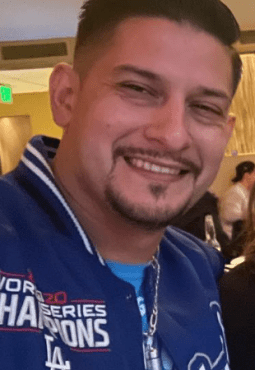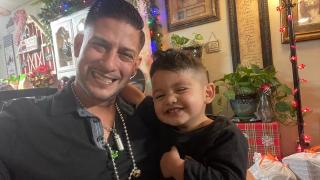In fall 2019, Felipe Soltero’s 5-year-old son was taking a boxing class. One day, while the two were practicing combination punches in the backyard, the boy, with an abundance of enthusiasm, threw a wild punch that landed right smack in his father’s groin.
“It hurt so much. I remember going down,” Soltero said. “It was a pretty good blow.”
It was a blow that ultimately saved his life.
The area where Soltero had been hit became swollen, and when it didn’t get better after several days, he went to the emergency room.

“They did an ultrasound and told me I needed to see my primary care doctor right away,” Soltero said. “But nobody mentioned cancer. I guess they didn’t want to scare me.”
He didn’t have a doctor at the time, but managed to find one quickly. His blood tests showed high levels of alpha-fetoprotein and lactate dehydrogenase — both markers for testicular cancer.
“That doctor sent me to a specialist, who did PET scans, and they discovered I not only had a mass in my testicles, but multiple masses in my abdomen and in my lungs,” Soltero said.
He got the diagnosis on his 33rd birthday — Stage 3 testicular cancer, which is the only type of cancer with no Stage 4, even after metastasis.
Until that backyard boxing lesson, he’d had no symptoms, so the diagnosis came as quite a shock.
Soltero, who lives in Fontana, California, is the operations manager for a staffing and logistics company. He and his wife Elena have five children, ranging in age from 3 to 16, with a sixth on the way.
“I was mostly worried about my kids. It was sad to think that I wouldn’t be there for them,” he said. “But we went to my birthday party and pretty much took things step by step.”
Step one — surgery to have the tumor in his testicle removed. After surgery was complete, the doctor told him he’d need chemotherapy to treat the other tumors and would have to find someone else for that.
The doctor he chose was Mohammadbagher Ziari, M.D., a medical oncologist and hematologist at City of Hope | Corona.
“First, I met his staff, and they were so kind. They explained the process and told me what to expect, told me everything that was going to happen or that could happen,” he said.
Then Soltero spoke with Ziari.
“I’m going to hit this aggressively,” Ziari told him. “You look like a strong individual, and together we’re going to kick this cancer.”
Soltero was put on the BEP regime, a first-line chemotherapy treatment for testicular cancer that combines the drugs bleomycin, etoposide and cisplatin.
He began therapy in March 2020, the same week the COVID-19 lockdown began. There was almost no traffic on the freeways, so getting to treatment was easy — but chemotherapy, that was tough.
“I looked like a creature, you know. I had no hair, no eyebrows, no eyelashes.”
And worse, he couldn’t keep food down — he was nauseous, dizzy and weak. He felt like a blob, he recalled, wanting to get up, but unable to do it.
“I have to say, though, the nurses at City of Hope were just super awesome, always cheerful, helpful, buying treats and things,” he said. “And they gave me medicines that helped with certain side effects. I just can’t say enough good things about them.”
His family came through big time, too.
“Our little baby always wanted to be with me. He would sleep with me, and we would watch baseball games together, My nephews would come over and rub my bald head because they liked the way it felt.”
And his wife, Elena, took up all the slack at home, and then some.
“She had to make two different dinners every night because I could only eat certain items. She’d keep the kids busy, take them to the beach or the movies, go get my medications and drive me to and from appointments. And my mother moved in to lend a hand,” he said.
Soltero also had help from his employer, who kept him on the payroll full time during the entire three months of his treatment.
There was a time, though, when the side effects of treatment were so bad, Soltero wanted to call it quits. Ziari provided the encouragement he needed to stick with it.
“He told me, ‘I’m hitting it hard, but your body is doing well, and you’ll get through it.’”
And get through it he did.
“Felipe has been cancer free for more than a year now,” Ziari said. “And he’s a great guy, wonderful. Everyone in my office loves him.”
The feeling is mutual.
“Dr. Ziari is a great doctor. He did exactly what he said he was going to do,” said Soltero. “And he’s also a very positive, very kind man.”
